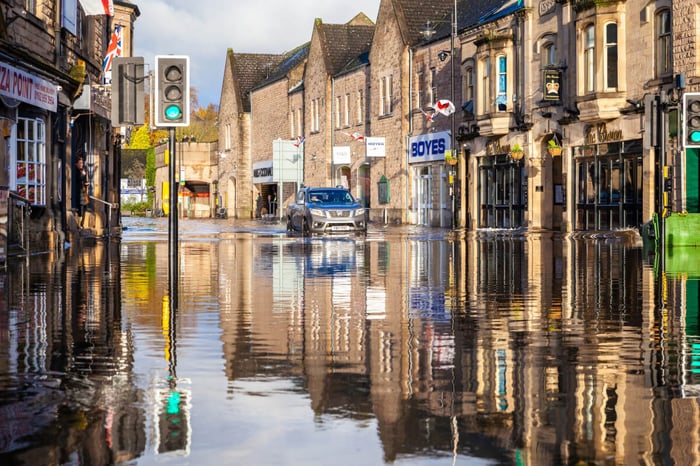Small businesses are among those most vulnerable during a flood season. There are several reasons for that:
- Unlike big international companies, small businesses do not have enough resources and networking power to restore after flooding instantly;
- Small businesses are often located in the most flood-prone areas - coastal areas, touristic sites, etc.;
- A small business will rarely have enough human resources to prepare the place for the upcoming flood season and keep on working efficiently.
In other words, small businesses rarely have enough time and resources to prepare for the flood season, withstand it with minimal damage, and come back to work right away.
At the same time, small businesses often form the backbone of their local communities, provide workplaces and goods and stimulate purchasing power. Not to mention those small businesses that work as touristic attractions and infrastructure, creating and supporting a whole industry in their area.
A small business can fall victim to different kinds of floods, from seasonal flooding due to heavy rainfall and snowmelt to unpredictable and destructive flash floods that cost millions of dollars every year.
In this article, we shall talk about the essential steps every small business can do almost effortlessly to ensure their safety during the upcoming flood season and secure assets, commodities, and resources, protecting people who are connected with a business one way or another.

The 10-step plan to protect your small business during a flood season
Here are the 10 steps anyone can take to be more prepared and secure in the face of another flooding. Whether you are a one-person enterprise or a small team, taking those 10-steps will be easy and natural:
- Make a plan - whether the business already went through flooding or you are preparing for your very first one, it is essential to determine the most vulnerable parts and areas and focus on protecting them;
- Flood Insurance - make sure that your insurance policy covers water damage and flooding. If not, adjust the policy beforehand, as in most cases, your flood insurance policy will come to action only several weeks after the purchase;
- Prepare the premises - clear the gutters and drainage, fix cracks in doors and walls, install flood gates and flood barriers, remove lost items and move the most vulnerable and valuable assets to a higher level;
- Consider alternatives - plan what you will do in case of power and water shortages, temporary lack of commodities, etc.;
- Stay aware - make sure to follow flood alerts, locate closed shelters and evacuation routes, make sure that every team member knows the safe areas and is able to direct customers there in case of flooding;
- Damage control - make sure to document and report all the damage as soon as you are able to return to your property;
- Communication - make sure to stay in touch with your team, customers, and the local community. It is essential to let know that the business remains active, offer and asks for assistance if needed;
- Apply for compensations - research all the compensations and payments your local authorities offer to local businesses after the flood season, make sure to comply and apply as soon as possible;
- Marketing - make sure to stay in touch with your customers, keep your social media and other communication channels active, inform customers when you are planning to come back to full operation, and fulfill the previously-made orders. Don`t forget to spread positive news and provide feedback to all sorts of comments;
- Repeat - after you go through the full cycle of the flood season, its damage and repairs, create a more detailed plan for the next case with more accurate numbers, estimates, and timeframes to be even more prepared for the next disaster.
After flood recovery for a small business.
What you should do during the first days and weeks after the flooding.
It is much easier to plan your after-flooding recovery process and make the most out of it if you know exactly which things to focus on and why.
Personal safety and wellbeing
- if you are the business owner, give yourself a couple of days to recover from the damage, calm down and check your physical and mental health before getting down to work;
- It is best to hire professionals to do the cleaning and repairs instead of wasting your time and energy on those tasks.
Staff and obligations
- Contact your financial and legal consultants to know exactly what kind of obligations you have in front of your staff, customers, suppliers, etc. in case of emergency;
- Stay in touch with your team, customers, and suppliers to let them know what the current condition of the business is.
Business operation
- revise all the financial recovery plans and options;
- Research and consider all the available alternative ways to reopen the business and continue operating.
Think of the future
- Estimate the efficiency of your existing flood control solution and think about what can be improved;
- If a certain product or solution like a flood barrier or flood gates performed particularly well, consider alternative ways to use them on your premises to prevent water damage in the future even better.
Do you want to know more about how to protect your small business from floods and water damage?
Contact Dam Easy now and discover modern flood control products and the latest solutions, get a consultation from our experts and make informed decisions about the equipment you need to make sure that your small business will withstand the upcoming and all following flood seasons.
$949.00
DAM EASY® FLOOD GATE - DOOR DAM Floods are becoming more common around the world. What was once a 100-year phenomenon is now a seasonal trend that homeowners must deal with. That’s EXACTLY why you need this Dam Easy Flood… Read MoreFlood Barrier Door Dam - Ultimate Flood Gate





